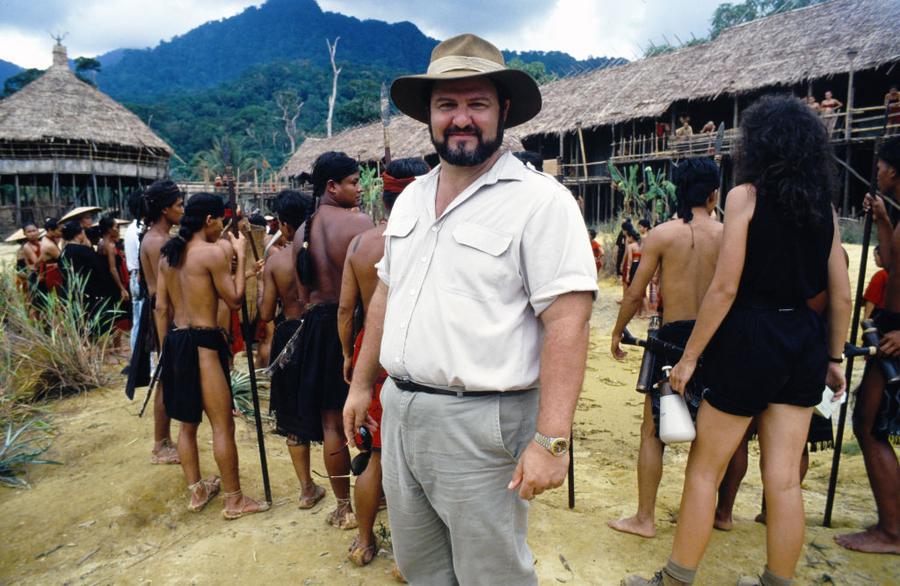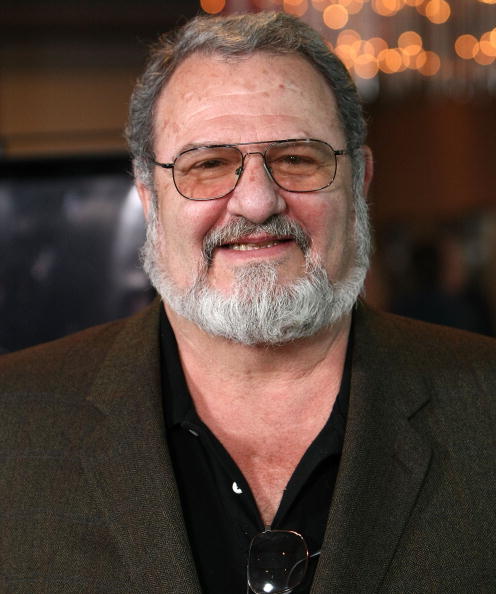What Is John Milius' Net Worth?
John Milius is an American screenwriter, director, and producer who has a net worth of $5 million. John Milius earned an Academy Award nomination for Best Writing, Screenplay Based on Material from Another Medium for the 1979 film "Apocalypse Now." He wrote and directed the films "Dillinger" (1973), "The Wind and the Lion" (1975), "Big Wednesday" (1978), "Conan the Barbarian" (1982), "Red Dawn" (1984), and "Farewell to the King" (1989). John also directed "Flight of the Intruder" (1991), wrote the screenplays for "The Devil's 8" (1969), "Evel Knievel" (1971), "The Life and Times of Judge Roy Bean" (1972), "Jeremiah Johnson" (1972), "Magnum Force" (1973), "Geronimo: An American Legend" (1993), "Clear and Present Danger" (1994), and "Texas Rangers" (2001), and came up with the story for "Extreme Prejudice" (1987). Milius made uncredited script revisions on the screenplays for "Dirty Harry" (1971), "Jaws" (1975), "Indiana Jones and the Temple of Doom" (1984), "The Hunt for Red October" (1990), "Eraser" (1996), "Saving Private Ryan" (1998), and "Behind Enemy Lines" (2001). John has served as a producer on the films "Hardcore" (1979), "1941" (1979), "Used Cars" (1980), and "Uncommon Valor" (1983) as well as the HBO series "Rome" (2005–2007), which he co-created with Bruno Heller and William J. MacDonald.
Early Life
John Milius was born John Frederick Milius on April 11, 1944, in St. Louis, Missouri. He grew up in a Jewish household with mother Elizabeth, father William, and two older siblings. William worked as a shoe manufacturer, and he sold Milius Shoe Company (which his grandfather founded in 1923) and retired when John was 7 years old. The family subsequently moved to Bel Air, California, where Milius became interested in surfing. At the age of 14, John began attending the Lowell Whiteman School, a private school in Steamboat Springs, Colorado, because, as Milius told CNN, "I was a juvenile delinquent." He started writing short stories, and in a 2003 interview with IGN.com, he stated, "I had learned very early, to write in almost any style. I could write in fluent Hemingway, or in fluent Melville, or Conrad, or Jack Kerouac, and whatever."
John studied kendo and judo during his youth, and he has said that he "felt more comfortable with things Japanese and with Japanese people than [he] did with Europeans." He tried to join the Marine Corps during the Vietnam War, but he was rejected because of his asthma. He said of being rejected by the Marine Corps, "I was devastated, I felt like I'd been rejected as a human being." In 1962, Milius fell in love with movies after stumbling upon a cinema that was showing Akira Kurosawa films. John attended the University of Southern California School of Cinema-Television, where he was classmates with George Lucas. His thesis film, "Marcello," won the Best Animation award at the National Student Film Festival.

(Photo by Paul Harris/Getty Images)
Career
Milius landed a summer job at American International Pictures in the story department with the help of his classmate Willard Huyck, and the two read scripts under producer Larry Gordon. John and Willard later teamed up to rewrite the screenplay for the 1969 film "The Devil's 8." Milius co-wrote 1971's "Evel Knievel" with Alan Caillou," followed by "The Life and Times of Judge Roy Bean" and "Jeremiah Johnson" (which he co-wrote with Edward Anhalt) in 1972. He co-wrote 1973's "Magnum Force" with Michael Cimino, and that year he made his feature film directorial debut with "Dillinger," which he also wrote. John wrote and directed 1975's "The Wind and the Lion," then he directed and co-wrote (with Dennis Aaberg) 1978's "Big Wednesday," which was inspired by his love of surfing. His screenplay for 1979's "Apocalypse Now" earned him an Academy Award nomination. The film was directed and co-written by Francis Ford Coppola, and in 2000, it was preserved in the Library of Congress' National Film Registry for being "culturally, historically or aesthetically significant."
Next, Milius directed 1982's "Conan the Barbarian," which he co-wrote with Oliver Stone. He co-wrote (with Kevin Reynolds) and directed the 1984 drama "Red Dawn" and wrote and directed the 1989 action-adventure "Farewell to the King." The most recent feature film John has directed is 1991's "Flight of the Intruder," and he later directed the 1994 TV movie "Motorcycle Gang" and the 1997 miniseries "Rough Riders." He co-wrote the 1993 Western "Geronimo: An American Legend" with Larry Gross and the 1994 action thriller "Clear and Present Danger" with Donald E. Stewart and Steven Zaillian. Starring Harrison Ford, "Clear and Present Danger" is based on the 1989 Tom Clancy novel of the same name, and it grossed $215.9 million at the box office. In 2000, Milius began working as a creative consultant for the Institute for Creative Technologies (ICT), a University Affiliated Research Center funded by the U.S. Army. Richard Lindheim, ICT's executive director, said of the decision to hire Milius, "Through his enormous body of work, John has shown a deep understanding of the human condition and the ways that conflict can be resolved. Furthermore our efforts will benefit greatly from his vision of the world in the near future, and the techniques and procedures that will be needed to maintain security." Milius co-wrote the screenplay for the 2001 Western "Texas Rangers" with Scott Busby and Martin Copeland, then he co-created the HBO series "Rome," which ran from 2005 to 2007 and earned a Golden Globe nomination for Best Television Series – Drama in 2005.

Alberto E. Rodriguez/Getty Images
Personal Life
John married Renee Fabri on January 7, 1967, and they welcomed sons Marco and Ethan before divorcing in January 1978. Milius wed actress Celia Kaye on February 26, 1978, and they had one child together, daughter Amanda. Amanda grew up to become a director, and she won several awards for her 2015 thesis film "The Lotus Gun." She also produced and directed the 2020 pro-Trump documentary "The Plot Against the President." John married his third wife, actress Elan Oberon in 1992. Milius had a stroke in 2010 that hindered his ability to move or speak, but he ultimately recovered. John's accountant/business manager Charles Riedy Jr. embezzled approximately $3 million from him in the late '90s and early 2000s, and in 2003, Riedy was charged with securities fraud.
Milius has described himself as a "Zen anarchist," but he aligns himself with conservative beliefs and was featured in the documentary "Rated R: Republicans in Hollywood." In a 1999 interview with "Film Threat," he stated, "I'm not a reactionary—I'm just a right-wing extremist so far beyond the Christian Identity people like that and stuff, that they can't even imagine. I'm so far beyond that I'm a Maoist. I'm an anarchist. I've always been an anarchist. Any true, real right-winger if he goes far enough hates all form of government, because government should be done to cattle and not human beings." John was previously a member of the National Rifle Association's board of directors. In 2009, he signed a petition supporting filmmaker Roman Polanski, who had been arrested after arriving in Switzerland to accept a lifetime achievement award. Polanski had been detained in relation to his 1977 charge of unlawful sexual intercourse with a minor, and the petition demanded his immediate release.
Awards and Nominations
In 1980, Milius earned an Academy Award nomination for Best Writing, Screenplay Based on Material from Another Medium for "Apocalypse Now." He has received three Writers Guild of America Award nominations: Best Drama Written Directly for the Screen for "The Wind and the Lion" (1976) and "Apocalypse Now" (1980) and New Series for "Rome" (2005). In 2007, John was honored with the Distinguished Screenwriter Award at the Austin Film Festival. He won a Lone Star Film & Television Award for Best TV Teleplay for "Rough Riders" in 1998, and he earned Bronze Wranglers at the Western Heritage Awards for Theatrical Motion Picture for "Jeremiah Johnson" (1972) and "Geronimo: An American Legend" (1994). Milius has also received a DVD Exclusive Award nomination for Best DVD Audio Commentary for "Conan the Barbarian" (2001) and a Banff Television Festival Award for Best Mini-Series for "Rome" (2006).
/2014/04/John-Milius.jpg)
/2009/11/Oliver-Stone.jpg)
/2014/05/Cole-Hauser.jpg)
/2019/11/Robert-Towne.jpg)
/2011/01/David-O.-Russell-1.jpg)
/2016/01/Rorion-Gracie.jpg)
/2021/12/Claudia-Schiffer.jpg)
/2011/03/Michelle-Trachtenberg.jpg)
/2015/01/GettyImages-151346507.jpg)
/2010/05/Carlo-Ancelotti.jpg)
/2012/06/GettyImages-73884432.jpg)
/2009/12/Jimmy-Goldstein.jpg)
/2009/11/Bobby-Brown.jpg)
/2015/04/jh.jpg)
/2016/04/GettyImages-524083760.jpg)
/2018/06/Mike-Lindell.jpg)
/2020/04/hailey-joel.png)
/2014/04/John-Milius.jpg)
/2016/01/Rorion-Gracie.jpg)
/2014/12/GettyImages-693545526.jpg)
/2014/06/Stanley-Kubrick-1.jpg)
/2013/08/GettyImages-150323857.jpg)
/2014/05/Cole-Hauser.jpg)
/2012/02/Diablo-Cody.jpg)
/2009/11/Oliver-Stone.jpg)